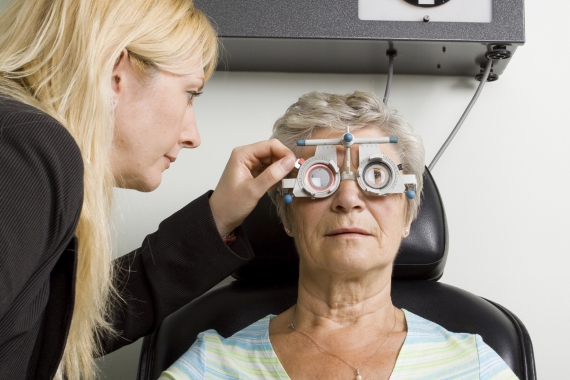Signs of Glaucoma
Glaucoma is a disease that affects the optic nerve located at the back of the eye. It is a leading cause of blindness if left untreated. The best way to protect yourself from this “silent thief of sight” is to schedule a glaucoma evaluation at Elmquist Eye Group and explore your treatment options.

Warning Signs of Glaucoma
Glaucoma develops slowly and sometimes without any noticeable loss of vision for many years. The symptoms listed below may not necessarily mean that you have glaucoma, but you should seek immediate care at Elmquist Eye Group if you notice one or more of them:
- Patchy blind spots in your side (peripheral) vision, often in both eyes
- Dark spot at the center of viewing
- Hazy or blurred vision
- Lines and edges appear distorted or wavy
- Unusual trouble adjusting to dark rooms
- Difficulty focusing on near or far objects
- Recurring pain in or around eyes
- Rainbow-colored circles around bright lights
- Severe headache
- Excess tearing or “watery eyes”
- Sudden loss of vision in one eye
Who is at Risk for Glaucoma?
According to the Glaucoma Research Foundation, people at risk for glaucoma include:
- Anyone over the age of 60
- African-Americans over age 40
- Family history of glaucoma
- Extremely nearsighted individuals
- Individuals with thin corneas
- History of diabetes
- History of high blood pressure
- History of elevated intraocular pressure
- History of steroid medication usage
The eye doctors at Elmquist Eye Group can detect early symptoms of glaucoma during your routine eye examination. We will discuss all of these factors and help you decide if you need glaucoma treatment or whether you should be monitored regularly to detect early signs of damage to the optic nerve.
Glaucoma Testing
Glaucoma often occurs when the normal fluid pressure inside the eye slowly rises, but checking only the eye pressure is not enough because even people with normal eye pressure can develop the disease.
At Elmquist Eye Group, we will measure your eye pressure (tonometry); inspect the drainage angle of your eye (gonioscopy); evaluate your optic nerve; and test the visual field of each eye. People at higher risk for glaucoma should get a complete eye exam, including eye dilation, every one or two years.
Comprehensive dilated eye exams are extremely important in detecting glaucoma before it damages your vision. When detected and treated at an early stage, glaucoma can be controlled.
To detect possible signs of glaucoma and prevent optic nerve damage and vision loss, schedule a glaucoma evaluation at Elmquist Eye Group in Fort Myers. Call us today at (239) 936-2020 for an appointment.
